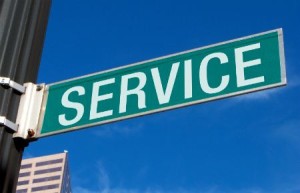Hope for a revitalised economy and stronger organisations?
I was reflecting on my work with leaders across multiple sectors recently, and looking for inspiration and insights into the deeper meaning of work, where we all spend so much of our lives on this planet. Inspiration, insight and deeper meaning might appear to be fanciful luxuries at present in our “post-crunch” workplace, (fast paced, transactional and frequently anxious as it often seems) but bear with me. Perhaps they are actually key to a new and better economy and workplace we would all like to see?
 Here’s what I read; “Service is the virtue that has distinguished the great of all times and which they will be remembered by. It places a mark of nobility upon its disciples.It is the dividing line which separates the two great groups of the world—those who help and those who hinder, those who lift and those who lean, those who contribute and those who only consume. How much better it is to give than to receive. Service in any form is comely and beautiful. To give encouragement, to impart sympathy, to show interest, to banish fear, to build self-confidence and awaken hope in the hearts of others, in short to love them and to show it is to render the most precious service.” Byant S Hinckley 1867-1961 USA
Here’s what I read; “Service is the virtue that has distinguished the great of all times and which they will be remembered by. It places a mark of nobility upon its disciples.It is the dividing line which separates the two great groups of the world—those who help and those who hinder, those who lift and those who lean, those who contribute and those who only consume. How much better it is to give than to receive. Service in any form is comely and beautiful. To give encouragement, to impart sympathy, to show interest, to banish fear, to build self-confidence and awaken hope in the hearts of others, in short to love them and to show it is to render the most precious service.” Byant S Hinckley 1867-1961 USA
The best leaders I have known (those who truly inspire others to act and lead themselves,) have been valued for their genuine and active care for their people and for relating to others in the ways listed above. They have been leaders who were looking to serve rather than be served. Jesus. Gandhi. Martin Luther King. Mandela. And others less well known, because to be known was not what drove them.
Take a moment-who is coming to mind for you in your own life? What impact did this person have on the place you worked…….. on you? So often this kind of serving leadership correlates with better organisational results. Frequently this way of being has been catalysed in the leader by the positive example of others family, colleagues or friends.  These leaders have been “loved” themselves, and transformed by it.
These leaders have been “loved” themselves, and transformed by it.
Of course, being British (and professional!), we would all hesitate to advocate increased love in the workplace when looking for increased economic output or creativity, energy, motivation and effectiveness. And it is true this kind of leadership is not a soft option, it is hard. That is why we see so little of it. But perhaps we should advocate and model servant leadership anyway.
Between you and me, wouldn’t you love to work somewhere you were loved? Isn’t this the kind of leadership the world is crying out for? What kind of economy, what kind of organisations might we see if service and love motivated us? It’s radical I know, but egotistical and greedy leadership appear to have failed us globally-economically and morally.
And I read that in the FT………..